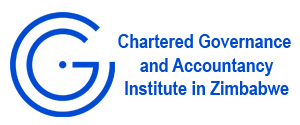The Diploma has been specifically developed to help students to understand and analyse GRC problems and apply practical solutions. It is relevant for Bank Managers, Risk Officers, Compliance Officers, Board Secretaries and Bank Accountants. On successful completion of all modules, the students will be conferred with an ICA International Diploma in Governance, Risk and Compliance (in Partnership with CGI Zimbabwe and DPC). The ICA International Diploma in Governance, Risk and Compliance is accredited by the Alliance Manchester Business School (AMBS) of the University of Manchester, United Kingdom.

Cost
1,850
Time to Complete
12 months
Delivery & Assessment
The Diploma’s course content is delivered through interactive, live virtual classrooms led by subject experts from CGI Zimbabwe, DPC and ICA. Course content is delivered through ICA’s easy-to-use online learning platform. The course material is supplemented by videos, practical exercises and self-assessment quizzes. There is instant access to a tutor for guidance and support. Students can join online forums to share experiences, ideas and study tips with other students. The assessment includes written practical-based assignments and workshop deliveries.
The Diploma Syllabus
The GRC Diploma is set at post-graduate level and has seven modules covering the following areas:
1. Corporate Governance
At the end of this module the candidate is expected
to:
i. Demonstrate an understanding of corporate governance tenets;
ii. Explain the role of the directors in corporate governance;
iii. Explain the role of the management in corporate governance;
iv. Outline risk governance best practices;
v. Explain the role of the supervisors in corporate governance;
vi. Explain the role of the shareholders in corporate governance;
vii. Show the importance of organisational values
and culture in corporate governance.
3. Deposit Protection Systems
At the end of this module the candidate is expected to:
i. Explain the concept of financial safety-net and deposit insurance system (DIS);
ii. Demonstrate an understanding of the mandate, power and governance of DIS;
iii. Discuss membership and coverage of DIS;
iv. Demonstrate an understanding of the concept of funding and fund management;
v. Describe public awareness strategies that can be adopted by deposit insurers;
vi. Explain the interrelationships among safety-net participants and cross border issues;
vii. Identify failure resolution and resolution measures available to deposit insurers;
viii. Describe key attributes of effective resolution regimes for financial institutions;
ix. Explain the core principles for effective deposit insurance systems from the International Association
of Deposit Insurers (IADI).
5. Financial Sector Regulation
At the end of this module the candidate is expected
to:
i. Summarize the objectives and principles of financial regulation;
ii. Explain the concept of authorisation in the financial services;
iii. Distinguish risk-based supervision from other forms of supervision;
iv. Describe the relationship of trust;
v. Identify regulatory breaches and their possible consequences;
vi. Devise a strategy to manage relations and communicate
with regulators.
7.Derivative Pricing and Financial Modelling
At the end of this module the candidate is expected
to:
i. Demonstrate an understanding of the theoretical
frameworks for pricing derivatives;
ii. Demonstrate an awareness of the differences between the real-world and the risk-neutral probability measures;
iii. Derive the underlying theory for pricing bonds and interest-rate derivatives;
iv. Show critical understanding of the assumptions underlying common models of asset process and interest rates;
v. Show a conceptual understanding of the processes in pricing derivative securities to enable the wider application of knowledge in different and new contexts;
vi. Calculate approximate prices for European and American-style derivatives using the binomial model;
vii. Demonstrate how to price and hedge simple equity derivatives contracts;
viii. Apply the main models for the term-structure of interest rates for pricing bonds and interest-rate;
ix. Develop models for financial reporting purposes (IFRS 9).
2. Supervision in Financial Services Sector
At the end of this module the candidate is expected
to:
i. Describe the changing models of supervision in the face of regional integration and globalisation;
ii. Examine the inherent flaws in the financial marketplace;
iii. Explore and justify the policy goals of regulation;
iv. Document the four approaches to financial supervision;
v. Distinguish financial supervision in key jurisdictions;
vi. Explain the supervisory role of the central bank.
4. Compliance Management in Financial Services Sector
At the end of this module the candidate is expected
to:
i. Explain compliance in financial services;
ii. Identify responsibilities for compliance in the financial services;
iii. Describe and explain the compliance function in the financial services;
iv. Recommend appropriate compliance risk management strategies for organisations;
v. Describe how to manage relationships with regulators and auditors;
vi. Summarise requirements for cross-border compliance in key jurisdictions;
vii. Evaluate outsourcing of the compliance function in the financial services.
6. Compliance Risk Managements in Financial Services
At the end of this module the candidate is expected
to:
i. Define money laundering and measures to prevent money laundering;
ii. Explain market abuse and available defences;
iii. Discuss bribery prevention measures;
iv. Illustrate how institutions can treat customers fairly;
v. Formulate business protection strategies for a financial services institution;
vi. Demonstrate an understanding of the competition law and available remedies.
Are you ready to study GRC?
Email registration@cgizim.org for more information or download the GRC brochure for more information.
Other Professional Courses
For the medium to long term development, the Institute offers the following additional courses:

IBAS Qualification
With 5 O’ Level passes, including English and Mathematics, you are ready to go

PSA Qualification
The program is specifically for all individuals working in the public sector.


